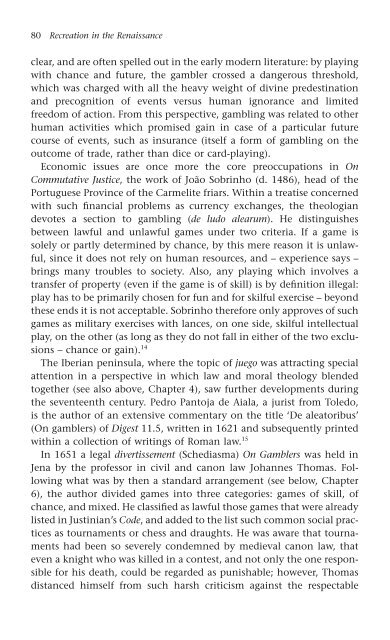Recreation in the Renaissance
Recreation in the Renaissance
Recreation in the Renaissance
- No tags were found...
Create successful ePaper yourself
Turn your PDF publications into a flip-book with our unique Google optimized e-Paper software.
80 <strong>Recreation</strong> <strong>in</strong> <strong>the</strong> <strong>Renaissance</strong><br />
clear, and are often spelled out <strong>in</strong> <strong>the</strong> early modern literature: by play<strong>in</strong>g<br />
with chance and future, <strong>the</strong> gambler crossed a dangerous threshold,<br />
which was charged with all <strong>the</strong> heavy weight of div<strong>in</strong>e predest<strong>in</strong>ation<br />
and precognition of events versus human ignorance and limited<br />
freedom of action. From this perspective, gambl<strong>in</strong>g was related to o<strong>the</strong>r<br />
human activities which promised ga<strong>in</strong> <strong>in</strong> case of a particular future<br />
course of events, such as <strong>in</strong>surance (itself a form of gambl<strong>in</strong>g on <strong>the</strong><br />
outcome of trade, ra<strong>the</strong>r than dice or card-play<strong>in</strong>g).<br />
Economic issues are once more <strong>the</strong> core preoccupations <strong>in</strong> On<br />
Commutative Justice, <strong>the</strong> work of João Sobr<strong>in</strong>ho (d. 1486), head of <strong>the</strong><br />
Portuguese Prov<strong>in</strong>ce of <strong>the</strong> Carmelite friars. With<strong>in</strong> a treatise concerned<br />
with such f<strong>in</strong>ancial problems as currency exchanges, <strong>the</strong> <strong>the</strong>ologian<br />
devotes a section to gambl<strong>in</strong>g (de ludo alearum). He dist<strong>in</strong>guishes<br />
between lawful and unlawful games under two criteria. If a game is<br />
solely or partly determ<strong>in</strong>ed by chance, by this mere reason it is unlawful,<br />
s<strong>in</strong>ce it does not rely on human resources, and – experience says –<br />
br<strong>in</strong>gs many troubles to society. Also, any play<strong>in</strong>g which <strong>in</strong>volves a<br />
transfer of property (even if <strong>the</strong> game is of skill) is by def<strong>in</strong>ition illegal:<br />
play has to be primarily chosen for fun and for skilful exercise – beyond<br />
<strong>the</strong>se ends it is not acceptable. Sobr<strong>in</strong>ho <strong>the</strong>refore only approves of such<br />
games as military exercises with lances, on one side, skilful <strong>in</strong>tellectual<br />
play, on <strong>the</strong> o<strong>the</strong>r (as long as <strong>the</strong>y do not fall <strong>in</strong> ei<strong>the</strong>r of <strong>the</strong> two exclusions<br />
– chance or ga<strong>in</strong>). 14<br />
The Iberian pen<strong>in</strong>sula, where <strong>the</strong> topic of juego was attract<strong>in</strong>g special<br />
attention <strong>in</strong> a perspective <strong>in</strong> which law and moral <strong>the</strong>ology blended<br />
toge<strong>the</strong>r (see also above, Chapter 4), saw fur<strong>the</strong>r developments dur<strong>in</strong>g<br />
<strong>the</strong> seventeenth century. Pedro Pantoja de Aiala, a jurist from Toledo,<br />
is <strong>the</strong> author of an extensive commentary on <strong>the</strong> title ‘De aleatoribus’<br />
(On gamblers) of Digest 11.5, written <strong>in</strong> 1621 and subsequently pr<strong>in</strong>ted<br />
with<strong>in</strong> a collection of writ<strong>in</strong>gs of Roman law. 15<br />
In 1651 a legal divertissement (Schediasma) On Gamblers was held <strong>in</strong><br />
Jena by <strong>the</strong> professor <strong>in</strong> civil and canon law Johannes Thomas. Follow<strong>in</strong>g<br />
what was by <strong>the</strong>n a standard arrangement (see below, Chapter<br />
6), <strong>the</strong> author divided games <strong>in</strong>to three categories: games of skill, of<br />
chance, and mixed. He classified as lawful those games that were already<br />
listed <strong>in</strong> Just<strong>in</strong>ian’s Code, and added to <strong>the</strong> list such common social practices<br />
as tournaments or chess and draughts. He was aware that tournaments<br />
had been so severely condemned by medieval canon law, that<br />
even a knight who was killed <strong>in</strong> a contest, and not only <strong>the</strong> one responsible<br />
for his death, could be regarded as punishable; however, Thomas<br />
distanced himself from such harsh criticism aga<strong>in</strong>st <strong>the</strong> respectable










